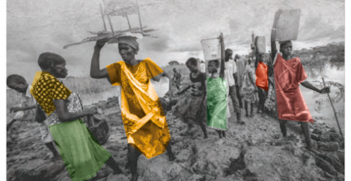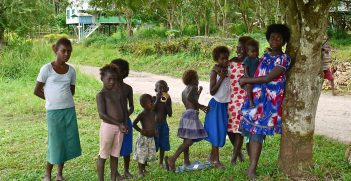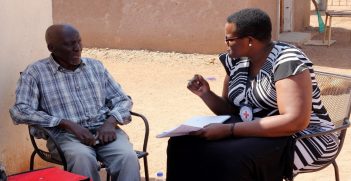People Suffering in Ukraine’s Frozen Conflict Far from Forgotten

Conflict in Eastern Ukraine has dragged on for almost five years, affecting all spheres of life for people near the “contact line.”
The Ukraine conflict has been dubbed both “forgotten” and “frozen.” Indeed, despite the close proximity of the conflict, life in Kiev appears to go on as in any modern city. This is far from the case in war-ravaged Eastern Ukraine. Shelling goes on every day, even though a cease-fire over the Christmas and New Year holidays has been adopted and partially held. Several million people continue to live close to the “contact line” and bear the brunt of hostilities, living with frequent water and electricity outages, limited access to healthcare and the constant risk of mines and other unexploded ordnance. Nevertheless, humanitarian assistance arrives regularly, and continues to reach the vulnerable.
The 420km long line that divides the Donbas has not moved significantly since 2014. Every day, thousands of people queue and cross at the five official entry-exit points. As the majority of those with the strength and means to move have already left the conflict zone, the elderly population suffers most. Pensioners living in areas outside of government control regularly undergo the arduous journey to government-controlled areas in order to collect their modest monthly pension. It is saddening that several people paid with their lives, unable to endure hours of the winter cold, or the sweltering heat of summer. Evidently, the need for areas where people can rest, get useful information and warm up after being exposed to sub-zero temperatures was urgent. The International Committee of the Red Cross (ICRC) has installed heating and cooling points in order to improve conditions on the journey. At these locations, Red Cross volunteers serve tea, provide first aid and help those with reduced mobility.
“They are far from toys. They are horrible, lethal weapons that spare no one.”
In September 2018, a mine accident killed three schoolboys . This is one example of the accidents which regularly occur due to mines buried in ravines and even in some backyards. The ICRC, together with the local Red Cross, has supported mine and safe behaviour education for children through theatre performances and also built a pilot safe playground in Pavlopyl in the Mariupol area.
Landmines have lasting impacts on the whole of society, as well as on livestock and the environment. They have claimed more than a thousand lives, a tenth of the overall human toll of the conflict. Men, who are often breadwinners for an extended family, are the most at risk. You hear tragic stories of those who never came back after driving over landmines: a husband in good health ploughing a field with a tractor, or a community leader who took her grandchildren to visit their mother. In another accident, two workers were delivering an excavator to repair a pipeline bringing clean water to Toretsk when their vehicle exploded.
Apart from receiving widespread international attention, these tragedies highlighted other concerns. These include the dependency of front-line communities on supplies of water, electricity and communications that run across the contact line. There is also a need for proper equipment and for health services to be ready to treat those wounded in the conflict.
Invisible scars from conflict
While men travel through dangerous areas to earn a living, help victims or operate and repair infrastructure that supplies even the other side of the contact line, women on the front line have been pillars of the community as household keepers, teachers and nurses while visiting remote villages. Since 2016, the ICRC has been “helping the helpers,” with psychologists training community members to help fellow residents overcome the psychological effects of the conflict such as stress, depression and anxiety. Last year, over 1000 educators, volunteers, social and healthcare workers were trained on how to provide psychosocial support. The psychological effect of the conflict has different faces. A woman from a village which is shelled every night told me that her grandson suffers from anxiety and has had a nervous tick since their house had been hit. Similarly, headmasters from two schools damaged by shelling mentioned behavioural disorders of children as an invisible effect of the ongoing hostilities.
“Even if they tell us that our relatives are probably dead, we will believe till the end they are alive,” said a family member of a missing person at a recent ICRC event. As in a number of other conflicts around the world, the ICRC visits conflict-related detainees and works with the families of the missing, registering tracing requests, assessing and communicating their needs and providing mental health support. It is estimated that at least over 1500 persons went missing during the conflict in Eastern Ukraine. Their families do not know what happened to them and suffer the pain of uncertainty, on top of facing financial, administrative, legal and health issues.
Harsh winters in no man’s land
In Eastern Ukraine, a benign activity such as gathering firewood can mean putting one’s life at risk. However, electricity, gas and water outages occur often and hard fuel is cheaper. People in the front-line settlements, many of which must be accessed with difficulty via checkpoints and unpaved roads through mined fields, burn anything they can find to heat their houses. In response, the ICRC has provided assistance on both sides of the contact line in form of wooden briquettes, coal, cash assistance to buy heating materials, radiators and insulation materials to keep the houses warm through its winterisation programme.
People living in Eastern Ukraine are not forgotten. The ICRC will carry out and continue its humanitarian mission, assisting and protecting the vulnerable on both sides of the contact line, day after day. We will strive to limit the suffering, by all means available.
There are glimmers of hope, such as the law on the status of missing persons and the law on mine action, as well as a remarkable solidarity between people to survive together. Decision-makers should make an effort to constructively address humanitarian issues and ensure key institutions provide services effectively. The ICRC is always ready to act as a neutral intermediary to help find lasting solutions.
Jana Bauerová is an ICRC delegate in Kiev, Ukraine
This article is part of the ‘Forgotten Conflicts’ series by the International Committee of the Red Cross in partnership with AIIA, highlighting the serious and often overlooked humanitarian consequences of armed conflicts and other situations of violence.
This article is published under a Creative Commons Licence and may be republished with attribution.





